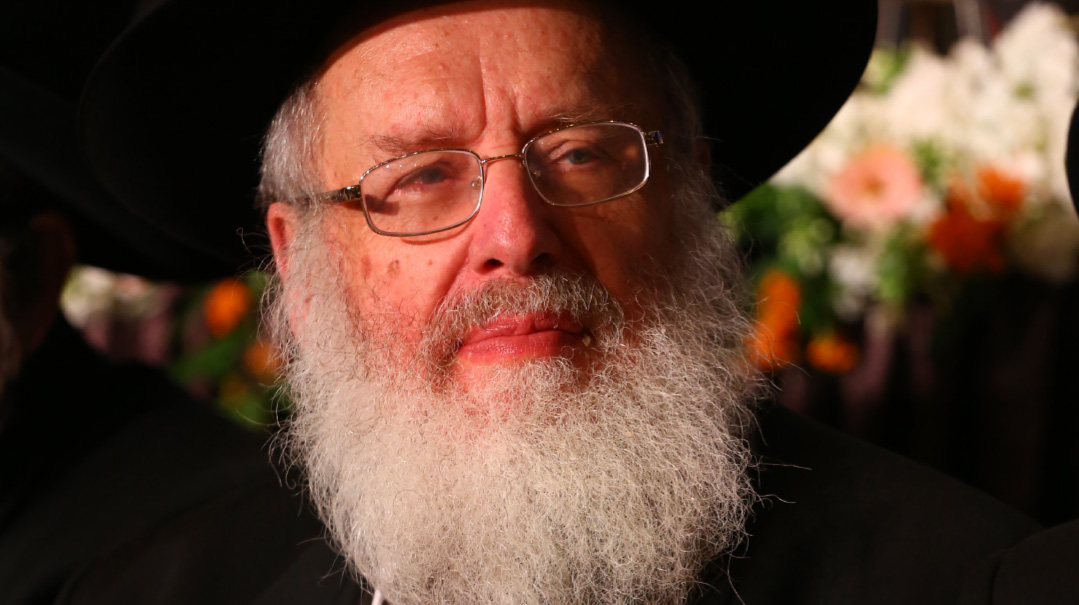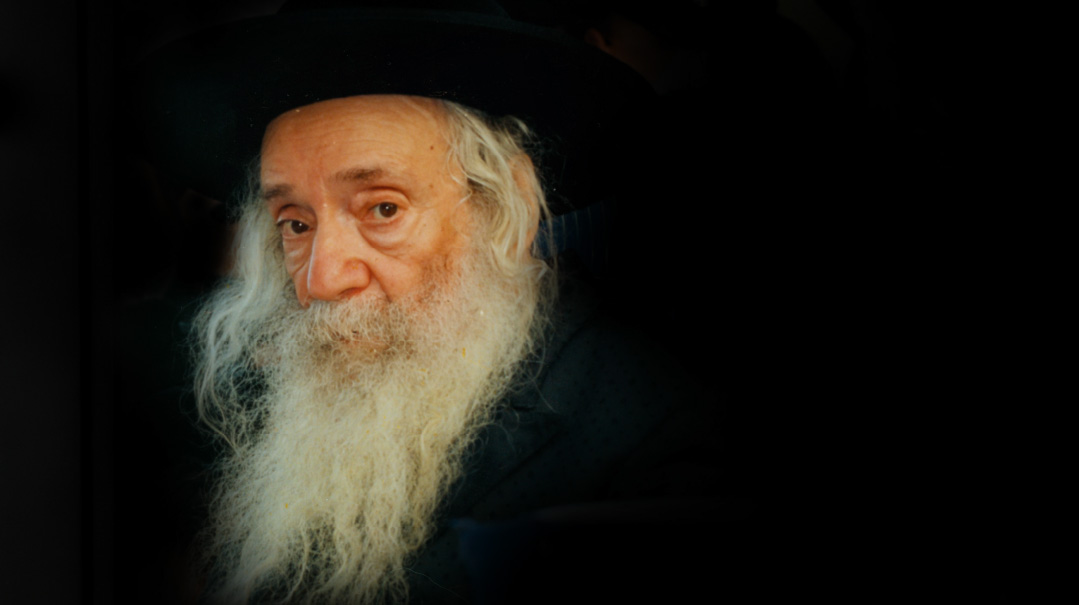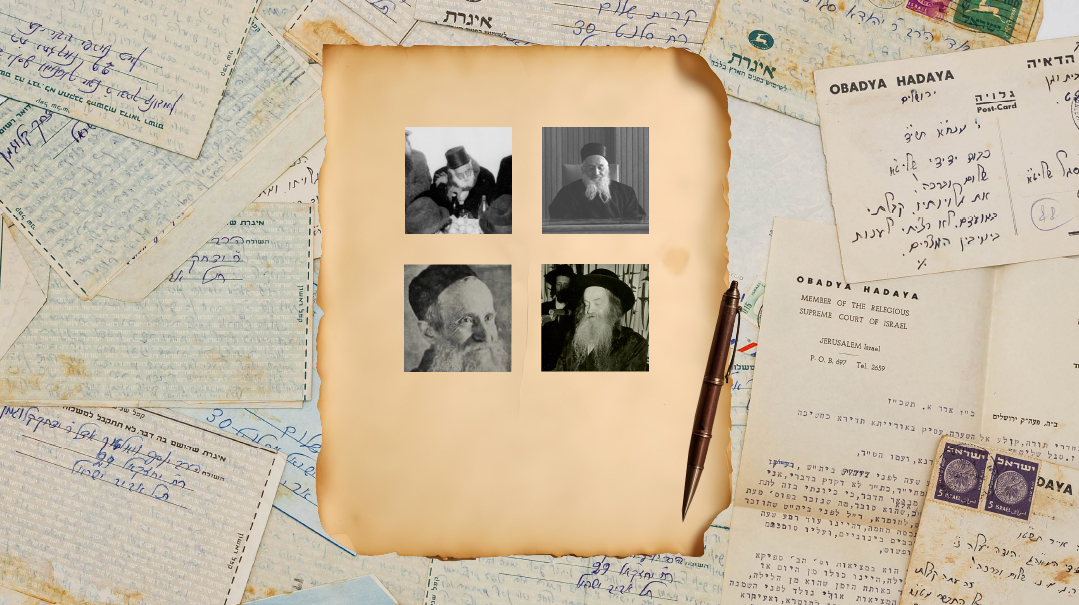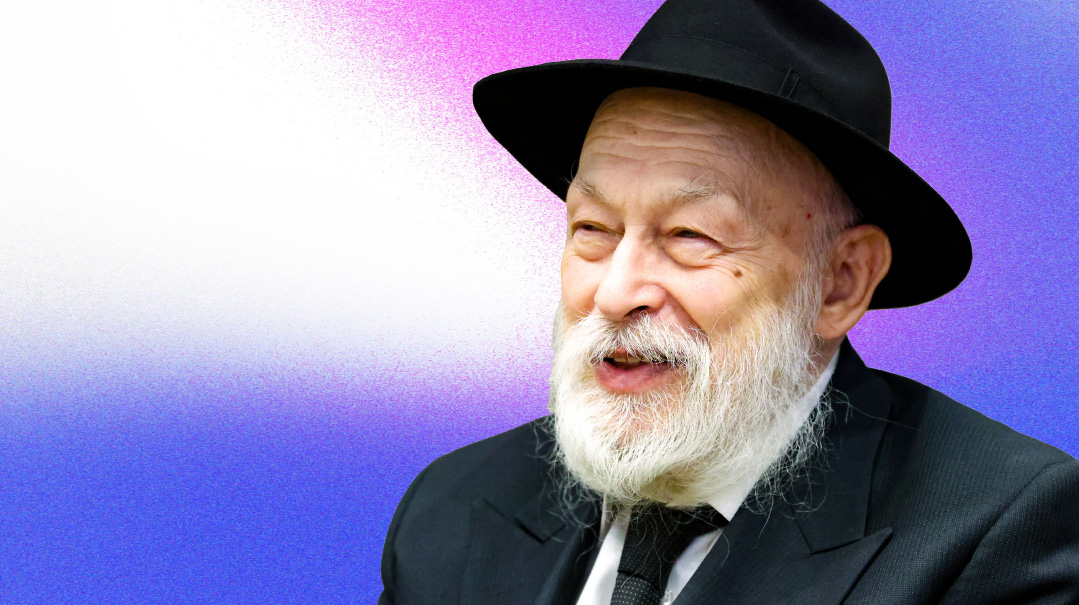Ripple Effect

Rabbi Beryl Gershenfeld is at the forefront of worldwide kiruv, riding the waves of its changing dynamic for over four decades. But while existential questions about G-d have been replaced by the drive for self-development and success, he’s confident that every Jew is open to a higher goal
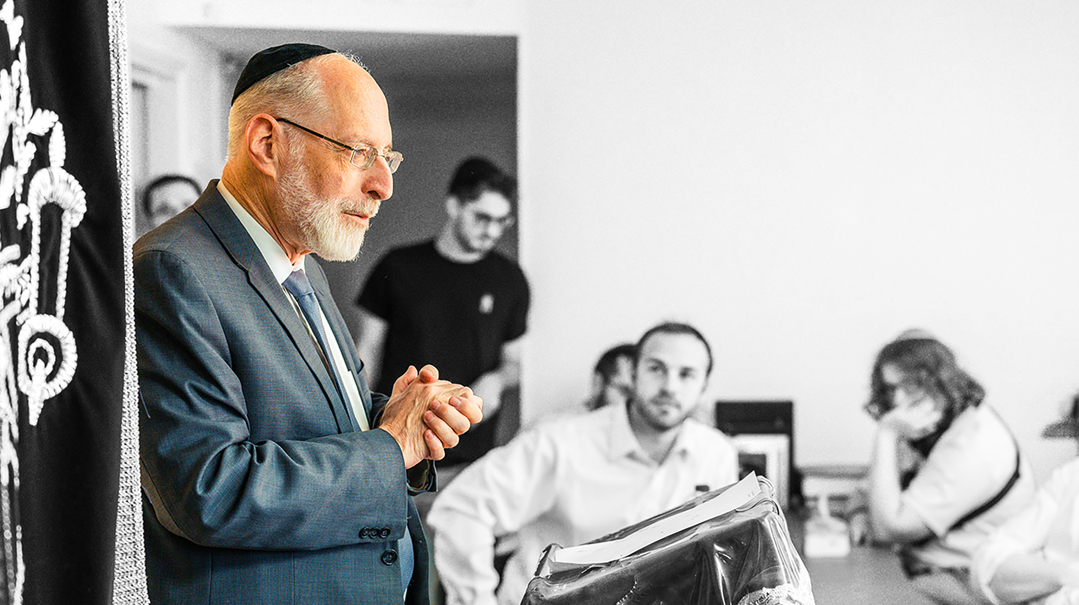
Photos: Meor and personal archives
Let me begin with a disclaimer: I cannot write with total objectivity about Rabbi Beryl Gershenfeld, for there is no one who played a bigger role than he did in my wife’s and my original decision to extend our honeymoon in Israel by 45 years.
After a class taught by Rabbi Gershenfeld at Ohr Somayach’s women’s school, my wife, Judith, approached him to question some of the things he had said. His immediate response was to invite us for Shabbos.
During the course of that Shabbos, we connected and discovered that we were both the oldest sons in all boy families, both had mothers of wide-ranging intellectual interests — his mother was a nationally renowned psychologist — and grandfathers who were very active in the Conservative movement.
Indeed, we were supposed to enter Yale Law School in the same class. Alas, by the time we finally met six years later, Rabbi Gershenfeld had already learned through at least half of Shas, and I had not yet opened a Gemara, though at least I had decided to leave the practice of law.
That Shabbos, Rabbi Gershenfeld arranged for us to meet Rav Nachman Bulman a”h on the way back from davening at Ohr Somayach, and Rav Bulman became our primary spiritual guide that summer and for years afterward. Within a few days, Reb Beryl had also arranged an apartment for us next door to Ohr Somayach. (If possible, Reb Beryl played an even larger role in my late brother Mattisiyahu’s decision to enter Machon Shlomo, and they learned together until my brother’s petirah.)
That first meeting with Reb Beryl took place at the very outset of his career teaching, just six years after he first entered Shema Yisrael, the forerunner of both Ohr Somayach and Aish HaTorah.
Today, Rabbi Gershenfeld, my neighbor in Har Nof, is arguably the most important figure in kiruv worldwide. He serves as rosh yeshivah of both Machon Shlomo, founded by his late father-in-law Rabbi Yaakov Rosenberg in 1983, and Machon Yaakov, which he initiated in 2005 and named after Rabbi Rosenberg. The Machons, as they are known, are both two-year programs, with a total of approximately 60 students annually. Their small size allows Rabbi Gershenfeld to develop each talmid individually.
He’s also founder and creator of Meor, a network of campus outreach organizations that began on one university campus in 2005 and currently includes centers on 20 campuses and three alumni centers, with over 35,000 alumni of Meor learning programs.
Return to Yourself
At various times, Reb Beryl and I have discussed our respective paths to teshuvah. Both of us felt the challenge of Ivan’s statement in Dostoevsky’s The Brothers Karamazov, “If G-d does not exist, everything is permitted.” Neither of us believed that everything is permitted. From an early age, Reb Beryl adds, “I felt a desire to be good, and realizing that desire required a standard of truth and morality.”
Teshuvah, he argues, is frequently mistranslated as repentance, which comes from the root, “to be repeatedly sorry.” That mindset causes a person to focus on his failures and sadness. However, the correct translation of teshuvah is “returning,” and that shifts the focus to positive goals. The question then becomes, what are you returning to?
“One of my rebbis, Rav Shlomo Wolbe, would often tell me in the name of his rebbi, Rav Yerucham Levovitz, that one returns to himself, to his own tzelem Elokim. That is the vision that animated my teshuvah and I seek to share that journey with my talmidim.”
Beryl Gershenfeld grew up in Philadelphia in a family with a strong Jewish identity but not connected to Torah and mitzvos.
“My father was in medicine, mother in psychology, and all around me I’d seen very wise people, but not all of them were good people or happy people,” he says. “At a pretty early age, I began to understand that wisdom is a very important goal, but there’s a special type of wisdom that could help a person lead a better and more meaningful life as well.
He lists three other factors that influenced his willingness to explore Torah more deeply: “One, the awareness of an ordered universe, whose secrets man is constantly gaining access to through his reason, and the consequent quest to find the source of that structure. Two, that human beings are internally wired to strive for order and meaning in their lives, the conviction that Freud’s account of man’s essential drives did not describe me, and that Viktor Frankl’s Man’s Search for Meaning was much more relevant to my self-understanding. And finally, the example of my parents for whom creating a better world brought far more joy than financial success.”
By the time he entered Trinity College in West Hartford, Reb Beryl was “keeping some form of kashrus, putting on tefillin, davening — but I wouldn’t describe myself as Torah observant. While I was growing in observance, it was still not from the point of keeping mitzvos because the Torah is true. And I knew that would require learning much more Torah.”
As president of the Trinity Hillel chapter, he began to look for a rabbinic advisor who shared his sense of urgency about connecting students to learning Torah. He put an advertisement in the local Hartford Jewish paper for a rabbi, whose duties would focus primarily on teaching and study.
Rabbi Kalman Rosenbaum, a musmach of Ner Yisroel and recently appointed principal of the Hartford day school, answered the call, surprising Reb Beryl in his dorm room, which was then crowded with young men watching an important playoff basketball game. Before Beryl (then Bob) could suggest another time to meet, Rabbi Rosenbaum commented, “I see you’re not doing anything important.”
During his senior year at Trinity, with his law school acceptances already in hand, Reb Beryl was invited to meet with Israeli Prime Minister Golda Meir and 20 student Jewish leaders to discuss the future of American Jewry. Uncharacteristically, he remained silent throughout the three-hour meeting, but walked out with the realization that, as he puts it, “I already knew more about Judaism than any of the other twenty students in that room, and I’m pretty sure I knew more about Judaism and Torah than Golda Meir as well.”
But he also realized something else: “It wasn’t enough to just keep some mitzvos. I had to become a learned Jew and accept responsibility that, in the common phrase of the time, ‘if you’re not part of the solution, you’re part of the problem.’ I decided to push off law school for at least two years and go to learn Torah so I could lead a better, more inspiring Jewish life.”
Shortly thereafter, he arrived at Shema Yisrael, a fledgling yeshivah founded in 1972 by Rabbi Noach Weinberg, Rabbi Mendel Weinbach, Rabbi Nota Schiller and Rabbi Yaakov Rosenberg to attract young Jewish men with little or no background in Jewish studies (two years later, Rav Weinberg founded Aish HaTorah and Shema Yisrael subsequently changed its name to Ohr Somayach). At the time, Rabbi Weinbach had more children than there were students. Reb Beryl slept on the floor of the as yet uncompleted Novardok yeshivah building (they still hadn’t installed window panes) in a sleeping bag, which he had to roll up each morning to make way for a nursery school class.
“Every two or three months, we would pack into Rabbi Rosenberg’s and Rabbi Schiller’s cars and head for the Kosel to daven that enough money come in to get us through the month,” he recalls.
Know How to Answer
“Back in the 1970s, I knew I needed to learn some Torah, so I came to Israel to study — and 50 years later I’m still studying, always trying to go deeper, with more meaning and more passion,” Rabbi Gershenfeld says. “And as I was asking questions myself, I discovered early on that the world is asking those questions, too.”
He joined the staff of Machon Shlomo, founded by his father-in-law, Rabbi Yaakov Rosenberg, in a brand-new Jerusalem neighborhood called Har Nof that consisted of a dozen buildings on a windswept mountainside accessed by a dirt path. At Machon Shlomo, Rabbi Gershenfeld hoped, he would help those young men begin to get their answers. When Rabbi Rosenberg passed away in 1999, the yeshivah fell under the leadership of Rabbi Gershenfeld.
But already in the mid-80s, Reb Beryl was actualizing his educational vision, engaging the questions that young people were asking, showing how the Torah answers them with sophistication and relevance.
Forty years later, questions are still being asked, but the parameters of the kiruv world have changed. The questions coming out of the 60s and 70s were about the meaning of the world and whether G-d exists. Today, young people are more practical and interested in exploring self-development and how can they build more successful lives and professions.
But that doesn’t faze Rabbi Gershenfeld. “Human beings are internally wired to strive for order and meaning in their lives,” he explains, “and it’s the educator’s mission to try to find the why of what interests them. I’ll give you an example of where they are today: We send our visiting students to different people’s homes for Shabbos meals, and then everyone comes over to my house afterward for an oneg on Friday night, where the floor is open for any questions anyone wants to ask.
“I’ll ask the students, ‘What would you like to talk about? Proofs of G-d? Why there was a Holocaust? The state of Israel and Zionism? Or maybe the different minhagim you saw tonight at different homes?’ About 80 percent answer that they want to understand the minhagim. The questions they’re asking now aren’t what they asked thirty years ago, which was more like, ‘Was it the Big Bang or the Big Design?’ Today they’re asking why there are two challahs on the Shabbos table. So it looks very mundane, but they are searching for how the practices of Judaism make sense and can provide inspiration. When you give an answer that’s powerful and mind-expanding, there will be more questions. What I’ve learned is that if the people around you stop asking questions, then maybe there was a problem with your response.”
Rabbi Gershenfeld shares an example: “One of the first Jewish customs a student faces is washing his hands before eating bread. If he asks why, he might be answered with a citation from the Mishnah Berurah 158:1 that a rabbinical decree was made that the priests had to wash their hands before eating terumah, and then another rabbinical decree was made that not just priests but all Jews are required to wash their hands, and then another decree was made that even though we don’t have a Temple now we still are required to wash our hands before we eat bread. This answer can leave newcomers cold and feeling Torah is not relevant to their modern lives. However, if we learn the inner meaning of the Gemara in Berachos (53b) — that there is a sanctification of the individual in the washing, then washing becomes a search for holiness and depth. The mitzvah is called netilas yadayim and not rechitzas yadayim because the key is to uplift our hands, representing our actions in the world, from where they generally hang opposite the lowest part of our body, to a higher plane, one of holiness.”
According to Rabbi Gershenfeld, answering questions is a fundamental part of the equation in helping the person along. “So we need to train our educators to know the real profound, deep answers and bring them down to the students’ level. When I was starting Machon Shlomo, Rav Shlomo Zalman Auerbach told me to take six months off and ask the world’s gedolei Torah how to build the foundation and make this happen.
“I went to Rav Wolbe and asked him, and he told me that when he established Beer Yaakov, he did the same thing: He went to Rav Dessler, and Rav Dessler told him that me that before telling him what the foundation of the yeshivah should be, he should listen to a half hour of his shmuess. So Rav Wolbe went and joined a very average-level shiur of 17-year-old postwar bochurim. Afterward, Rav Dessler asked Rav Wolbe how long he thought it took him to prepare. Rav Wolbe didn’t want to insult him, so he said, ‘It probably took two hours.’ ‘No,’ Rav Dessler said. ‘I’m not that big a gadol. It took nine hours — three hours to learn the sugya, three hours to organize it clearly in my mind, and three hours to bring it down so that the students could understand it.’ ”
Every Line an Opportunity
Rabbi Gershenfeld says one of the great gifts of his life was his exposure to Rav Moshe Shapira ztz”l. When Rabbi Rosenberg started Machon Shlomo, Reb Beryl went to Rav Shapira and asked him for guidance as to what the basis of the new institution should be. Rav Shapira replied, “Lo b’shamayim hee — people believe that Torah is not in front of them and only occurs in special times and places — that its ‘sham.’ A rebbi’s mission is to show their students that every line of Torah is a profound opportunity to engage with Hashem’s wisdom.”
And that connection and engagement often comes with the realization that a person can restore balance to his life. “The initial impulse toward teshuvah often begins with a sense that something is misaligned, out of whack, that one is not fulfilling the mission for which one was created,” says Rabbi Gershenfeld. “And the goal is to show the talmid that the Torah provides the tools for restoring the balance.”
One of Rabbi Gershenfeld’s favorite phrases is “self-actualization,” though he is quick to point out that, “I use self-actualization as a rough translation of mi’hakoach el hapoel [from potential to actualization], in the same way that the Maharal and Arizal used the expression 500 years prior to modern psychology.”
At both Machon Shlomo and Machon Yaakov, Rabbi Gershenfeld gives a vaad called “Knowing Yourself,” which focuses on the discovery of one’s unique purpose. (The essence of that vaad is found in Nurture Their Nature, by Rabbis Yosef Lynn and Jack Cohen, talmidim of Rabbi Gershenfeld.)
Becoming what Rabbi Gershenfeld calls an “adam hashalem” means that the Torah has to affect everything about us — how we raise our children, how we relate to our spouses. A campus Hillel director once accused Rabbi Gershenfeld of having an agenda and of wanting all the Meor students to becoming shomer Shabbos. Rabbi Gershenfeld responded, “Every non-profit has an agenda. That’s why they exist. My goal is to help every student to be a growing Jew. If he is shomer Shabbos, but not a good husband, a nurturing parent, or an honest employee, then we haven’t engaged him Jewishly in a proper fashion.”
Yet becoming this adam hashalem is a lifelong journey. “No one goes from twenty pushups to forty overnight. There are many inevitable failures along the way,” he says. Much of his one-on-one time with talmidim is spent discussing concrete plans for improvement in specific areas, and those plans must include a realistic schedule with a period of spiritual accounting built in.
No one is a more ardent proponent of the power of Torah to transform individual lives — and an entire society — than Rabbi Gershenfeld. And he is convinced that baalei teshuvah are uniquely suited to appreciate that transformative power, “because we’ve come to Torah at a more mature age, and because we’ve experienced the contrast of a dull life without meaning.”
And in his view, baalei teshuvah are also uniquely suited to convey it to the larger Torah world with passion. “My wife’s grandfather, Rav Shimon Schwab, used to say that baalei teshuvah is the wrong name,” Reb Beryl told the crowd at a recent unity event in Jerusalem. “Rather, they should be called mevakshei Hashem. But if we called them that then the larger community would have to emulate them.”
Rabbi Gershenfeld admits that his long-term outreach goal is to inspire students to want to change the world and empower them in how to do so. “I’m convinced that if we produce more actualized human beings, more actualized Jews, the world will be a better place,” he says, “and I want to be part of that process.”
If the University of Pennsylvania is any indication, maybe it’s working. At a tenth anniversary celebration of Meor, Charles (Chaz) Howard, the university’s head chaplain, lauded Meor for exposing students to the central questions they must ask themselves: What does it mean to be a mature person? What does a healthy relationship look like? How does one find a proper work/life balance? “If every Jewish student participated in Meor,” he declared, “it would change the entire campus in very positive ways.”
The ability to help others maximize their potential is perhaps Rabbi Gershenfeld’s greatest strength. Rabbi Avraham Yitzchok Jacobs, the founder and director of Machon Shlomo’s spinoff Machon Yaakov, is a prime example of what he describes as Rabbi Gershenfeld’s ability, “to see someone’s potential much more clearly than they do, and help them develop that potential to have the highest impact on Klal Yisrael.”
Prior to coming to Machon Shlomo in 1986, Jacobs had already been nominated for both an Emmy Award and a Pulitzer Prize for investigative reporting. And after returning to the United States, he became the top-rated telecommunications stock analyst on Wall Street. Yet along the way, he and Rabbi Gershenfeld began discussing the possibility of Rabbi Jacobs leaving Wall Street and becoming involved in Torah education. It was an ambitious idea, but over time, those discussions evolved into the possibility of Rabbi Jacobs actually opening up his own institution on the model of Machon Shlomo.
After making aliyah in 2003, Rabbi Jacobs set 2006 as the opening date for Machon Yaakov, named after Rabbi Yaakov Rosenberg. But in 2005, Machon Shlomo had more high-quality applicants than it could handle, and Rabbi Gershenfeld asked him to open a year earlier than planned. Rabbi Jacobs consented on the condition that Rabbi Gershenfeld accept the title and role of rosh yeshivah, setting policy on all spiritual matters, but with no administrative responsibilities.
One instance in which Rabbi Gershenfeld did get involved was in suggesting another former Machon Shlomo talmid, Rabbi Yosef Lynn, to be mashgiach. Rabbi Jacobs himself didn’t know much about Rabbi Lynn, other than that he was a former triathlete, had been valedictorian of his class at University of Colorado architecture school, had later learned in Mir, and had absolutely no relevant previous experience. He asked Rabbi Gershenfeld why he should even think about hiring someone with no experience. All Rabbi Gershenfeld suggested was, “Just meet with him, and decide for yourself.” At that meeting, Rabbi Lynn himself admitted that hiring him was probably “a bad idea.” But Rabbi Jacobs trusted Rabbi Gershenfeld’s instincts, and Rabbi Lynn has been a mainstay of Machon Yaakov ever since.
Testing the Model
In 2005, the same year Machon Yaakov began, many US outreach campus programs closed because of their high expense. Reb Beryl saw this as a tragedy, as a veritable abandonment of a generation of Jews whose connection to Judaism was weak and whose moral visions were as yet undeveloped. If the status quo prevailed, he reasoned, many of the best and brightest of the next generation would be lost.
Remembering his own journey to Torah, Reb Beryl believed that these students could best be engaged by creating a dynamic program focusing on Judaism’s inspiring moral and ethical wisdom, given over by passionate educators.
Building an organization like Meor required self-confidence, ambition and courage, but it would also require a talented partner. Rabbi Gershenfeld set his sights on Tom (Yaakov) Steinberg, a former Machon Shlomo talmid with extensive business experience, keen intelligence, and wealthy connections.
At the time, Tom was president of Tisch Family Interests and managing financial assets for the Tisch Brothers, Larry and Bob, two of the richest Jews in America, whose holdings included controlling interests in CBS and the New York Giants football franchise. The Tisches were also very active in Jewish communal affairs, and the connection would prove a major asset for Meor. For a number of years, Meor had an annual fundraising dinner in MetLife stadium, at which guests could interact with New York Giants players.
At the very outset, Rabbi Gershenfeld and Tom Steinberg established threefold criteria for selecting campuses. The school would have to be academically strong and/or a state school with a large Jewish population; there would have to be at least 2,000 Jewish students on campus (that number has declined over the years as Jewish enrollments at Ivy League schools have plummeted); and there would have to be an adjacent Orthodox Jewish community in which the educators and their families could live and which would serve as a resource for students as their Jewish identity strengthened.
The cofounders sought to avoid duplication of communal resources, for instance, if there was already a campus Torah learning program. And Rabbi Gershenfeld stressed to the campus directors and wrote into their contracts that they must make strenuous efforts to maintain good relations with the campus Hillel, which in many cases hosted Meor, and the campus Chabad.
To test the model, two trial programs were opened at University of Pennsylvania and at University of Binghamton. Today Meor exists on 20 campuses (e.g. Harvard, Princeton, Columbia, Penn) and three alumni centers, and engages over 3,500 college students a year in Jewish programming.
Meor changed dramatically with October 7 and its aftermath. Over the last seven months, as the anti-Israel campus protests have been waging an all-out war to make Jews on campus feel embarrassed and ashamed of their Judaism, Meor has moved in with intellectual responses and social support.
If formerly, Meor appealed to approximately a quarter of the campus Jewish students who were open to new ideas and learning more about their Judaism, today it appeals to around three-quarters of Jewish students. Rabbi Gershenfeld estimates that there has been a 50 percent increase in students seeking to know why they should still identify as Jewish or be proud of the fact.
Rabbi Zach Horowitz, a Meor educator at Columbia University, stressed that even harder on Jewish students than fear of being physically attacked has been the social isolation — being unfriended on social media by non-Jewish friends, or “ghosted” by those to whom they thought they were close. That has led them to seek places of Jewish refuge on campus, where they can be enveloped by the Jewish community and feel safe.
Rebecca Klamen, a Jewish educator at the University of Pennsylvania, reports that all their programs are overflowing. She notes that the students feel if they’re going be hated for being Jewish, they should really learn more about Jewish practice and living. Rebecca tells me that many students feel “that living a more Jewish life is all we can do” as an act of both defiance and self-respect.
No Higher Task
As with Machon Shlomo and Machon Yaakov, Rabbi Gershenfeld identified hiring and development of staff as the key to Meor’s success. He was looking for Torah educators capable of both teaching classes and learning privately with students. But above all, he was looking for those infused with his own mesirus nefesh for the Jewish people, and willing to do the unglamorous, grunt work of recruitment, not just looking for an opportunity to give shiurim. One campus rabbi, for instance, sends out 300 messages to students every Erev Shabbos and hosts approximately 120 students in a tent for at least one Shabbos meal every week.
For Rabbi Gershenfeld, it’s part of the bigger picture, of his commitment to educators who haven’t learned Torah in order to become maggidei shiur, but who are learning Torah in order to become activists and change the world.
“Communal activists don’t always have the deep ideas, and the scholars don’t always have the ambition,” he says. “I would like to see more Torah activists and profound educators. If you have a desire to learn without a desire to help others grow, then this side has to be developed. Hashem should give me the koach and insight to help move it forward.”
Rabbi Gershenfeld is a master at infusing campus rabbis and educators with the belief that there is no higher task than doing what they’re doing now, says Steinberg. No doubt because that is what he truly believes. Campus kiruv typically has a high turnover rate, yet more than half the Meor rabbis have been on campus for at least seven years, and some of them since the movement’s inception.
I ask Reb Beryl how he measures success. He quotes Rav Aharon Feldman, rosh yeshivah of Ner Yisroel and a major influence on Reb Beryl since his early days in yeshivah, who told him, “Your job is not to make someone frum. Your job is to demonstrate the grandeur and nobility of a Torah life.”
Donors traditionally want statistics on how many students have become shomer Shabbos and the like, but that’s not how Rabbi Gershenfeld defines success.
“If a student doesn’t start keeping Shabbos, that is not a failure,” he notes. “But if a student goes away without the feeling that he has more potential than he dreamed of, and that the Torah can provide the insight and inspiration for tapping that potential, that would be a failure.”
Rabbi Gershenfeld is skeptical of measurements based on reaching certain markers within a particular time frame.
“The students, like all of us, are on a journey, and we cannot know where that journey will end,” he says. Even for students who end up at Machon Shlomo, Machon Yaakov, or one of the other yeshivos for relative beginners, it can be a process of six years from their initial exposure to their entry into yeshivah or seminary.
Zack Rosen reflects one such journey. One of the times I spoke for the University of Pennsylvania Maimonides Fellowship, Rabbi Shmuel Lynn, then the executive director of Meor at Penn and an old friend, pointed to a student with bright red hair whom he was very excited about, and not just because he was an all-Ivy League basketball player.
Like most young American Jews, Zack was “out of there” after his bar mitzvah and had no Jewish friends during in high school. But when, after college, he was weighing offers to play basketball professionally in France, Italy, and Israel, he chose Israel primarily because of his involvement with Meor while at Penn. And after having played professionally for several years, he was off to yeshivah. He is now married, living in Israel, and learning and teaching Torah full-time, except for the summer, when he uses his unique skills and background to run a basketball camp for Orthodox boys in America.
Watch the Pebbles
Toward the beginning of his teaching career, there were those who told Reb Beryl that he was not suited for chinuch. Even a certain Torah authority told him to go back to law school. He was told he was too much of a perfectionist, too much of an idealist — and he would suffer too much when he invested heavily in a student and nothing came of it. One renowned psychologist even suggested that because he had fenced in college, and fencing is an individual and aggressive sport, he would not be well-suited to working with others in a group. He told his then fiancé, Gila, “one thing I surely do not want to be is another mediocre rabbi.”
That summer, Rav Shlomo Freifeld was staying in Jerusalem’s Sanhedria Murchevet neighborhood, and Reb Beryl went to pour out his heart to him. After listening to him, Rav Freifeld responded, “Beryl, there are only two types of people in the world. When you’re sitting by a pond with a pebble in your hand, some people throw it and watch it sink to the bottom. Those people get burned out, because lots of times, even if you’re trying to make the world better, if it doesn’t succeed right then, you’re out. Other people throw in the stone and watch the concentric circles ripple their way across the pond. If you put good energy into the world, that will never go away. Our mission is to throw pebbles in the water, even if we can’t see the results. We know that throwing the pebbles creates energy and the ripples will move outward. If you focus only on your short-term impact, you’ll burn out, but if you concentrate on the long-term impact, then you’ll surely be successful.”
Reb Beryl felt sure he was in the latter category. And he’s been creating ever-expanding ripples of Torah around the Jewish world since.
(Originally featured in Mishpacha, Issue 1011)
Oops! We could not locate your form.


